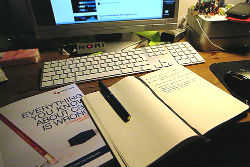
When I first started graduate school as an online student, I remember three words that I thought would make my semester a piece of cake: Open. Book. Test. While many online courses feature proctored exams taken at local test centers, other classes use open book or note exams instead. Terrific! No need to study ahead of time. Open book test means “easy A,” right? Sadly, I found this was NOT the case. Although having my textbooks and notes available during online exams proved helpful, many of my open book tests were just as hard as the in-class tests I had taken during my undergraduate career. If you’re an online student, or looking to become one soon, don’t dismiss an open book exam as easy to ace. Having an open textbook is great, but here are three big reasons why you need to study for an open book test.
3 Reasons to Study for an Open Book Test
1. When your exam is “open book,” expect to be asked about THE ENTIRE BOOK.
An open book test is a double-edged sword. While you have the right to access all of your notes and textbooks during the test, the instructor also has the right to ask about literally anything that has been covered in your class. This can amount to a LOT of information, especially if the exam is a mid-term or a final. Think about it: Every lecture, every page and every PowerPoint presentation up to this point could end up on the exam. So, when you start the test, make sure you have all of your material organized and in front of you. Just don’t expect to automatically ace the test without studying the information beforehand, because…
2. Your open book test will probably be timed.
You’ve got all of your textbooks and notes in front of you…great! Keep in mind, though, your test will probably be timed. To be honest, I have yet to encounter an online course exam that wasn’t timed. This means that no matter how far along you are, once the time limit is exceeded, the test stops whether you are done or not. Lingering too long on any single question could cost you greatly. Avoid this time crunch by reviewing as much of the study material as possible before the exam. Otherwise, you’ll find yourself reading through multiple chapters or stumbling through your notes for every test question. Unless you’re an accomplished speed reader, this approach can get painful in a hurry.
3. Teachers may use trick questions to determine if you really understand the course concepts.
Okay, you’ve got all of your books and notes, and you’ve skimmed them in advance, so you’re ready to take the test! Well…maybe. Most teachers strive to test your level of understanding, not your ability to memorize discrete facts. Expect to see a few tricky questions designed to test your mastery and ability to apply key course concepts. For example, it’s possible to see questions like, “True or False: The Internet was invented in the 1990s.” Many people might incorrectly choose “True.” The Web as a graphical user interface was invented in the 1990s, but the Internet technically began as a communications system many years earlier. Believe it or not, teachers don’t ask these questions because they’re evil (well, most of them aren’t, anyway). Instructors need a way to test clarity and depth of knowledge, and for online quizzes and exams, getting tricky is one way of getting that done. As an online student, you’ll likely see a lot of open book quizzes and exams. Don’t kid yourself into thinking every one will be an easy A. If you expect to jump into a big test, even an open book one, without reading the material and committing key concepts to memory beforehand, you’re asking for trouble. Make sure you have your notes on hand AND that you understand them well enough to know where to pull quickly information from to answer the questions in time. Know the facts themselves well enough to make sure you aren’t trapped by trick questions. Bottom line: Even with open book tests, you still have to study!
About the Author: In addition to pursuing and writing about higher education, David Handlos works as a Lead Software Performance Engineer at Fiserv. He has also worked for Kansas State University as the webmaster, managing both the College of Engineering and Engineering Extension web sites. Handlos holds a Bachelors of Science in Computer Engineering from Kansas State University and a Masters in Information Systems which he earned online from Dakota State University.
Image Credits: Darice/Flickr
